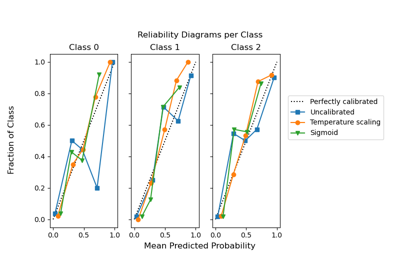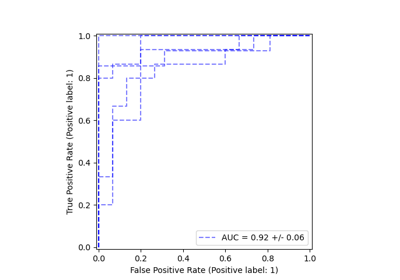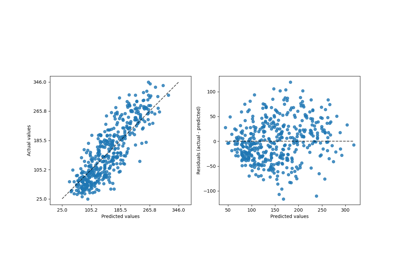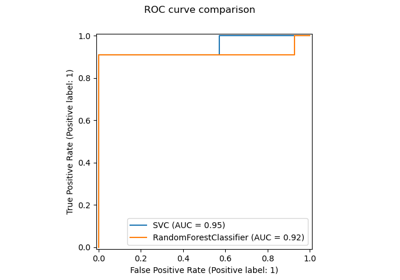Note
Go to the end to download the full example code or to run this example in your browser via JupyterLite or Binder.
Release Highlights for scikit-learn 1.6#
We are pleased to announce the release of scikit-learn 1.6! Many bug fixes and improvements were added, as well as some key new features. Below we detail the highlights of this release. For an exhaustive list of all the changes, please refer to the release notes.
To install the latest version (with pip):
pip install --upgrade scikit-learn
or with conda:
conda install -c conda-forge scikit-learn
FrozenEstimator: Freezing an estimator#
This meta-estimator allows you to take an estimator and freeze its fit method, meaning
that calling fit does not perform any operations; also, fit_predict and
fit_transform call predict and transform respectively without calling fit. The
original estimator’s other methods and properties are left unchanged. An interesting
use case for this is to use a pre-fitted model as a transformer step in a pipeline
or to pass a pre-fitted model to some of the meta-estimators. Here’s a short example:
import time
from sklearn.datasets import make_classification
from sklearn.frozen import FrozenEstimator
from sklearn.linear_model import SGDClassifier
from sklearn.model_selection import FixedThresholdClassifier
X, y = make_classification(n_samples=1000, random_state=0)
start = time.time()
classifier = SGDClassifier().fit(X, y)
print(f"Fitting the classifier took {(time.time() - start) * 1_000:.2f} milliseconds")
start = time.time()
threshold_classifier = FixedThresholdClassifier(
estimator=FrozenEstimator(classifier), threshold=0.9
).fit(X, y)
print(
f"Fitting the threshold classifier took {(time.time() - start) * 1_000:.2f} "
"milliseconds"
)
Fitting the classifier took 3.02 milliseconds
Fitting the threshold classifier took 0.56 milliseconds
Fitting the threshold classifier skipped fitting the inner SGDClassifier. For more
details refer to the example Examples of Using FrozenEstimator.
Transforming data other than X in a Pipeline#
The Pipeline now supports transforming passed data other than X
if necessary. This can be done by setting the new transform_input parameter. This
is particularly useful when passing a validation set through the pipeline.
As an example, imagine EstimatorWithValidationSet is an estimator which accepts
a validation set. We can now have a pipeline which will transform the validation set
and pass it to the estimator:
with sklearn.config_context(enable_metadata_routing=True):
est_gs = GridSearchCV(
Pipeline(
(
StandardScaler(),
EstimatorWithValidationSet(...).set_fit_request(X_val=True, y_val=True),
),
# telling pipeline to transform these inputs up to the step which is
# requesting them.
transform_input=["X_val"],
),
param_grid={"estimatorwithvalidationset__param_to_optimize": list(range(5))},
cv=5,
).fit(X, y, X_val=X_val, y_val=y_val)
In the above code, the key parts are the call to set_fit_request to specify that
X_val and y_val are required by the EstimatorWithValidationSet.fit method, and
the transform_input parameter to tell the pipeline to transform X_val before
passing it to EstimatorWithValidationSet.fit.
Note that at this time scikit-learn estimators have not yet been extended to accept user specified validation sets. This feature is released early to collect feedback from third-party libraries who might benefit from it.
Multiclass support for LogisticRegression(solver="newton-cholesky")#
The "newton-cholesky" solver (originally introduced in scikit-learn version
1.2) was previously limited to binary
LogisticRegression and some other generalized linear
regression estimators (namely PoissonRegressor,
GammaRegressor and
TweedieRegressor).
This new release includes support for multiclass (multinomial)
LogisticRegression.
This solver is particularly useful when the number of features is small to medium. It has been empirically shown to converge more reliably and faster than other solvers on some medium sized datasets with one-hot encoded categorical features as can be seen in the benchmark results of the pull-request.
Missing value support for Extra Trees#
The classes ensemble.ExtraTreesClassifier and
ensemble.ExtraTreesRegressor now support missing values. More details in the
User Guide.
import numpy as np
from sklearn.ensemble import ExtraTreesClassifier
X = np.array([0, 1, 6, np.nan]).reshape(-1, 1)
y = [0, 0, 1, 1]
forest = ExtraTreesClassifier(random_state=0).fit(X, y)
forest.predict(X)
array([0, 0, 1, 1])
Download any dataset from the web#
The function datasets.fetch_file allows downloading a file from any given URL.
This convenience function provides built-in local disk caching, sha256 digest
integrity check and an automated retry mechanism on network error.
The goal is to provide the same convenience and reliability as dataset fetchers while giving the flexibility to work with data from arbitrary online sources and file formats.
The downloaded file can then be loaded with generic or domain specific functions such
as pandas.read_csv, pandas.read_parquet, etc.
Array API support#
Many more estimators and functions have been updated to support array API compatible
inputs since version 1.5, in particular the meta-estimators for hyperparameter tuning
from the sklearn.model_selection module and the metrics from the
sklearn.metrics module.
Please refer to the array API support page for instructions to use scikit-learn with array API compatible libraries such as PyTorch or CuPy.
Almost complete Metadata Routing support#
Support for routing metadata has been added to all remaining estimators and functions except AdaBoost. See Metadata Routing User Guide for more details.
Free-threaded CPython 3.13 support#
scikit-learn has preliminary support for free-threaded CPython, in particular free-threaded wheels are available for all of our supported platforms.
Free-threaded (also known as nogil) CPython 3.13 is an experimental version of CPython 3.13 which aims at enabling efficient multi-threaded use cases by removing the Global Interpreter Lock (GIL).
For more details about free-threaded CPython see py-free-threading doc, in particular how to install a free-threaded CPython and Ecosystem compatibility tracking.
Feel free to try free-threaded CPython on your use case and report any issues!
Improvements to the developer API for third party libraries#
We have been working on improving the developer API for third party libraries. This is still a work in progress, but a fair amount of work has been done in this release. This release includes:
sklearn.utils.validation.validate_datais introduced and replaces the previously privateBaseEstimator._validate_datamethod. This function extendscheck_arrayand adds support for remembering input feature counts and names.Estimator tags are now revamped and a part of the public API via
sklearn.utils.Tags. Estimators should now override theBaseEstimator.__sklearn_tags__method instead of implementing a_more_tagsmethod. If you’d like to support multiple scikit-learn versions, you can implement both methods in your class.As a consequence of developing a public tag API, we’ve removed the
_xfail_checkstag and tests which are expected to fail are directly passed tocheck_estimatorandparametrize_with_checks. See their corresponding API docs for more details.Many tests in the common test suite are updated and raise more helpful error messages. We’ve also added some new tests, which should help you more easily fix potential issues with your estimators.
An updated version of our Developing scikit-learn estimators is also available, which we recommend you check out.
Total running time of the script: (0 minutes 0.118 seconds)
Related examples



